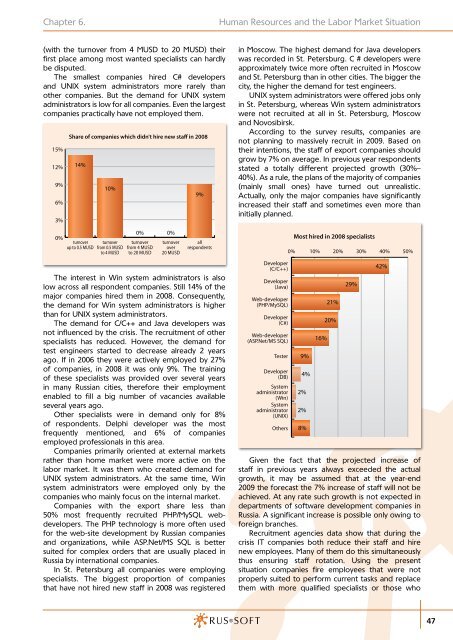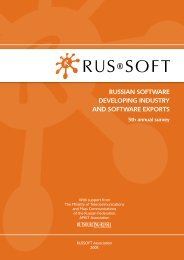russian software developing industry and software exports
russian software developing industry and software exports
russian software developing industry and software exports
You also want an ePaper? Increase the reach of your titles
YUMPU automatically turns print PDFs into web optimized ePapers that Google loves.
Chapter 6.<br />
Human Resources <strong>and</strong> the Labor Market Situation<br />
(with the turnover from 4 MUSD to 20 MUSD) their<br />
first place among most wanted specialists can hardly<br />
be disputed.<br />
The smallest companies hired C# developers<br />
<strong>and</strong> UNIX system administrators more rarely than<br />
other companies. But the dem<strong>and</strong> for UNIX system<br />
administrators is low for all companies. Even the largest<br />
companies practically have not employed them.<br />
15%<br />
12%<br />
9%<br />
6%<br />
3%<br />
0%<br />
Share of companies which didn't hire new staff in 2008<br />
14%<br />
turnover<br />
up to 0.5 MUSD<br />
10%<br />
turnover<br />
from 0.5 MUSD<br />
to 4 MUSD<br />
The interest in Win system administrators is also<br />
low across all respondent companies. Still 14% of the<br />
major companies hired them in 2008. Consequently,<br />
the dem<strong>and</strong> for Win system administrators is higher<br />
than for UNIX system administrators.<br />
The dem<strong>and</strong> for C/C++ <strong>and</strong> Java developers was<br />
not influenced by the crisis. The recruitment of other<br />
specialists has reduced. However, the dem<strong>and</strong> for<br />
test engineers started to decrease already 2 years<br />
ago. If in 2006 they were actively employed by 27%<br />
of companies, in 2008 it was only 9%. The training<br />
of these specialists was provided over several years<br />
in many Russian cities, therefore their employment<br />
enabled to fill a big number of vacancies available<br />
several years ago.<br />
Other specialists were in dem<strong>and</strong> only for 8%<br />
of respondents. Delphi developer was the most<br />
frequently mentioned, <strong>and</strong> 6% of companies<br />
employed professionals in this area.<br />
Companies primarily oriented at external markets<br />
rather than home market were more active on the<br />
labor market. It was them who created dem<strong>and</strong> for<br />
UNIX system administrators. At the same time, Win<br />
system administrators were employed only by the<br />
companies who mainly focus on the internal market.<br />
Companies with the export share less than<br />
50% most frequently recruited PHP/MySQL webdevelopers.<br />
The PHP technology is more often used<br />
for the web-site development by Russian companies<br />
<strong>and</strong> organizations, while ASP.Net/MS SQL is better<br />
suited for complex orders that are usually placed in<br />
Russia by international companies.<br />
In St. Petersburg all companies were employing<br />
specialists. The biggest proportion of companies<br />
that have not hired new staff in 2008 was registered<br />
0%<br />
turnover<br />
from 4 MUSD<br />
to 20 MUSD<br />
0%<br />
turnover<br />
over<br />
20 MUSD<br />
9%<br />
all<br />
respondents<br />
in Moscow. The highest dem<strong>and</strong> for Java developers<br />
was recorded in St. Petersburg. C # developers were<br />
approximately twice more often recruited in Moscow<br />
<strong>and</strong> St. Petersburg than in other cities. The bigger the<br />
city, the higher the dem<strong>and</strong> for test engineers.<br />
UNIX system administrators were offered jobs only<br />
in St. Petersburg, whereas Win system administrators<br />
were not recruited at all in St. Petersburg, Moscow<br />
<strong>and</strong> Novosibirsk.<br />
According to the survey results, companies are<br />
not planning to massively recruit in 2009. Based on<br />
their intentions, the staff of export companies should<br />
grow by 7% on average. In previous year respondents<br />
stated a totally different projected growth (30%–<br />
40%). As a rule, the plans of the majority of companies<br />
(mainly small ones) have turned out unrealistic.<br />
Actually, only the major companies have significantly<br />
increased their staff <strong>and</strong> sometimes even more than<br />
initially planned.<br />
Developer<br />
(C/C++)<br />
Developer<br />
(Java)<br />
Web-developer<br />
(PHP/MySQL)<br />
Developer<br />
(C#)<br />
Web-developer<br />
(ASP.Net/MS SQL)<br />
Tester<br />
Developer<br />
(DB)<br />
System<br />
administrator<br />
(Win)<br />
System<br />
administrator<br />
(UNIX)<br />
Others<br />
Most hired in 2008 specialists<br />
0% 10% 20% 30% 40% 50%<br />
9%<br />
4%<br />
2%<br />
2%<br />
8%<br />
16%<br />
21%<br />
20%<br />
29%<br />
42%<br />
Given the fact that the projected increase of<br />
staff in previous years always exceeded the actual<br />
growth, it may be assumed that at the year-end<br />
2009 the forecast the 7% increase of staff will not be<br />
achieved. At any rate such growth is not expected in<br />
departments of <strong>software</strong> development companies in<br />
Russia. A significant increase is possible only owing to<br />
foreign branches.<br />
Recruitment agencies data show that during the<br />
crisis IT companies both reduce their staff <strong>and</strong> hire<br />
new employees. Many of them do this simultaneously<br />
thus ensuring staff rotation. Using the present<br />
situation companies fire employees that were not<br />
properly suited to perform current tasks <strong>and</strong> replace<br />
them with more qualified specialists or those who<br />
47








